Mile 10,793. Home. 75 total days on the road.
The first thing I did when I got home was walk through a screen door, knocking it off the tracks. Twenty-five years in this house and not once, until now, have I walked through a screen door. And believe me, there are ample opportunities with 6 screen doors in my house. My mind is still on the road and in those quiet, uncrowded places. If it’s anything like my return from the Galapagos in 2013 I’ll need a few weeks to re-adjust, to get used to the busyness of my hometown and my life. I’m not ready to be around a group of people, drive around town for more than a quick errand, or to subject myself too loud or negative stimulus. I’m slow to reach out to catch up with friends and put dates on my calendar. But life has a way of moving forward regardless. Planning meetings are being scheduled next week for one of my volunteer gigs, haircut and dental appointments are nearing, I have to quickly make decisions about two 2020 trips. That and I’m not one to sit idle long.
My mom and cousin, who saw us off, welcomed us home making it feel as if no time had passed. A homemade meal waited for us in the refrigerator. Propped up against our planning map in a nice neat row were all the postcards sent to my mom, sent from almost every place we visited.
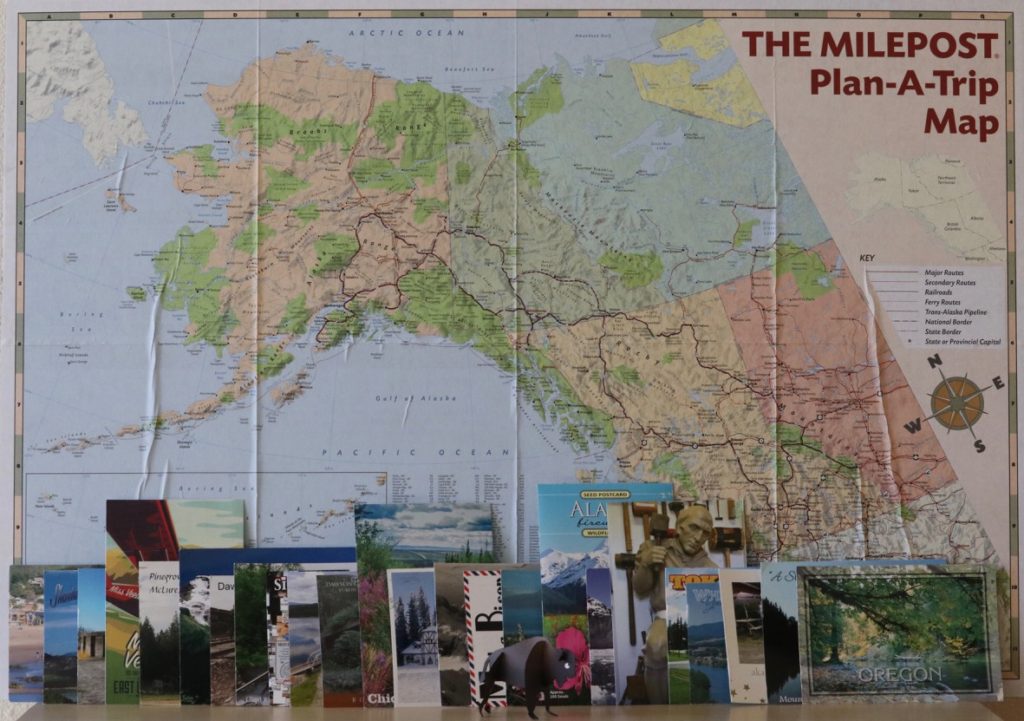
A painted pot full of planting soil and Fireweed seeds mailed to my cousin’s daughter awaited us in the atrium – a gift, a thank you for postcards, a memento of a special trip.
The house, under the care of my mom, is in better shape than I left it. Weeds and overgrown plants which I fully expected to return to are non-existent thanks to her care. My cousin’s son mowed the lawn and kept my hybrid car clean and running. A card from a friend, tons of Facebook and Instagram comments, and many texts welcomed us home. We are well-loved and are grateful for everyone who supported us on this journey and whose time and services made the trip possible.
The cat wasn’t quite sure what to make of us and has since been begging for that other woman who gave him more food (my mom) to come back.
The Aljo couldn’t stay on the street long so our first days back were busy, unloading truck and trailer, cleaning the insides, and power-washing them both.

Fine dust from our drive on the Top of the World Highway and dirt and caked-on mud from all the construction zones and rainy days washed away. Finally we said goodbye, taking the Aljo to storage, unhooking and stabilizing it for the last time. I shed a few tears. Mark joked afterwards that he needed to start carrying Kleenex. He’ll find out soon enough, now that we’re going to be spending the greater part of every day together, tears of joy and sadness are not all that uncommon. We both breathed a sigh of relief. My greatest fear was something happening to Mark on the trip while his was something happening to the trailer. Neither came to pass.
The truck has been fully serviced. All that’s left to be done is repair/replace the passenger side running board that Mark damaged early on, in Jasper, driving into a hard to see ridiculously placed curb. And then there’s the crack in the windshield – something I think we’ll keep for awhile – our souvenir, a conversation starter.
The passage of time has been the strangest adjustment to make. In the house it feels as if no time has passed, everything is as we left it. I had coffee with a friend this morning picking up in conversation where we left off a few months ago. Mark and I frequently look at each other and ask what happened to June and July? Nothing has changed yet it’s now mid-August. Football season starts in a week.
Outside there are subtle changes hinting at the passage of time – the comfortable temperatures of early June long gone, the brown hills which normal in any other summer seem excessively dry after having spent a summer surrounded by green trees and grasses. My pharmacy’s phone refill service has been updated to accept verbal commands, our reinstated Plated meal service no longer offers weekly salmon dishes but for an extra fee offers organic chicken, and the leaves on the trees I pruned prior to our departure have filled in. Time moved on without us.
As I go through the photos and start talking about the trip I can’t help but think about the variety of campgrounds, vehicles, and activities. If you have the desire to go it can be a trip of your own making. Men and women traveled solo with only themselves and maybe a dog on which to rely, with friends and family in a single vehicle or a small group of vehicles, or as strangers soon to become friends part of a large caravan. You can make the trip in a car and stay at motels along the way as long as you’re not looking to stay at the Ritz. Some campgrounds offer multiple sleeping solutions, including a small number of cabins, and the bigger towns usually have one or two motels. Some car travelers camped.
We passed several bicyclists and many motorcyclists. In Chicken, AK we ran across a group of motorcyclists making their return journey home – to Mexico City. Converted buses, some of which were painted like the bus we saw towards the end of our trip trimmed with a border of green pine trees. Teardrop and other tiny trailers, many of which were only large enough to sleep in. The one in our Whitehorse campground painted to look like a watercolor of the outdoors made me smile. Towable RVs like trailers, toy haulers, and fifth wheels. Class A (land yachts), B (vans and camper vans), and C (built on a truck chassis) motorhomes. Pop-up campers. All of varying sizes. But the strangest of all was the rolling hostel, a Rotel bus, a capsule hotel.
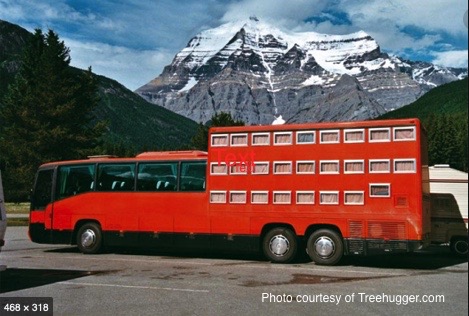
On the bus you ride in passenger seats during the day and sleep in pod capsules at night. There is a large kitchen on board and probably a bathroom, but I’m not sure about the shower. I first heard about this on the RVing to Alaska Facebook group, but later saw one at our campground in Denali. During the day it travels or sightsees and at night it returns to the campground.
Travelers from all over the world. In the evening I enjoyed walking the campground looking at license plates, some of which were from abroad. I thought we had driven far, but many campers came from Florida, Texas, and the east coast. Once we reached Whitehorse the license plates became mostly Canadian and in Alaska, mostly Alaskan. Many people fly into either Whitehorse or Anchorage (or come in via cruise ship) and rent an RV. A Swiss couple we met owned and stored an RV in Whitehorse and in the summers flew out from Switzerland to enjoy the wide-open spaces, something there is very little of at home.
Camping options are abundant, especially if you’re flexible and can go without services for a few days. There were more campgrounds than towns and they ranged from an overnighter at a pullout on the road (or a rest area in our case), to primitive public campgrounds, to public and private campgrounds with just electrical and water hook-up and one onsite sani-dump to a full range of individual site services including cable TV and shareable services such as a pool, a clubhouse, laundry room, showers, and pickle ball courts. There was a wedding ceremony and reception at the campground we stayed at in Castle Rock, WA. That campground even had tiny houses with people living in them. Yep, many campgrounds had semi-permanent residents – construction workers in the area only as long as the duration of a job, employees running the campground for the summer, people whose permanent home is their RV, and others whose circumstances I’m sure I cannot even imagine. Many of these sites had lawn furniture, lattice around the base of their trailer, potted plants, and as you can see here, a cat who appears to be very much at home.
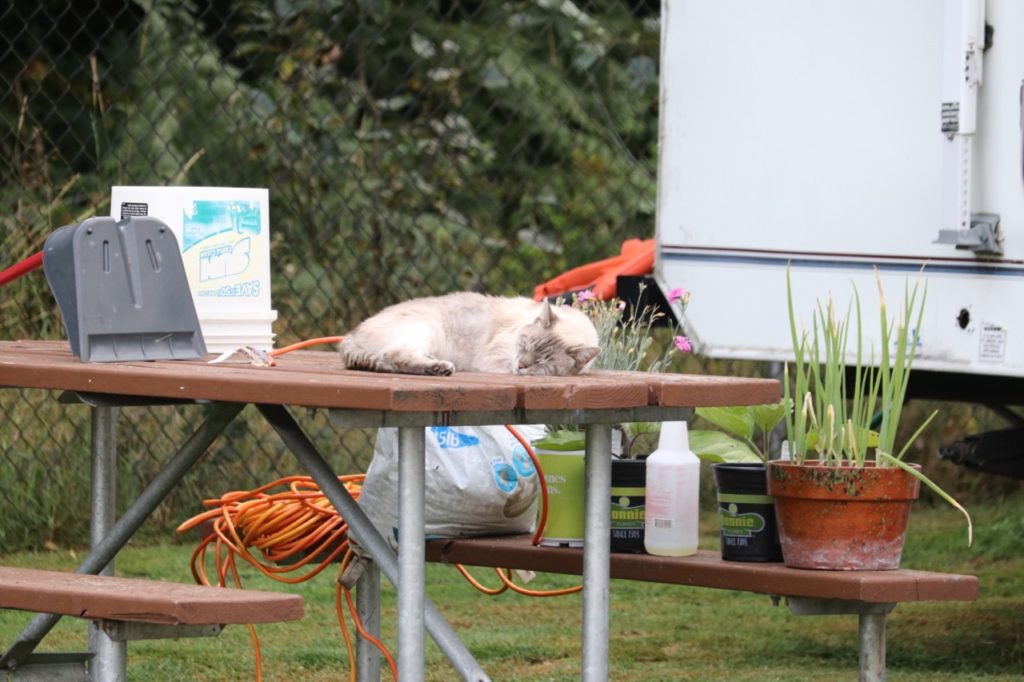
Some campgrounds are more like parking lots like the one we stayed at in Watson Lake. Not a stitch of landscaping, all gravel, no picnic table or space to open your awning and set up your own table. This one felt more like an RV sales lot, really, and was by far our least favorite campground.
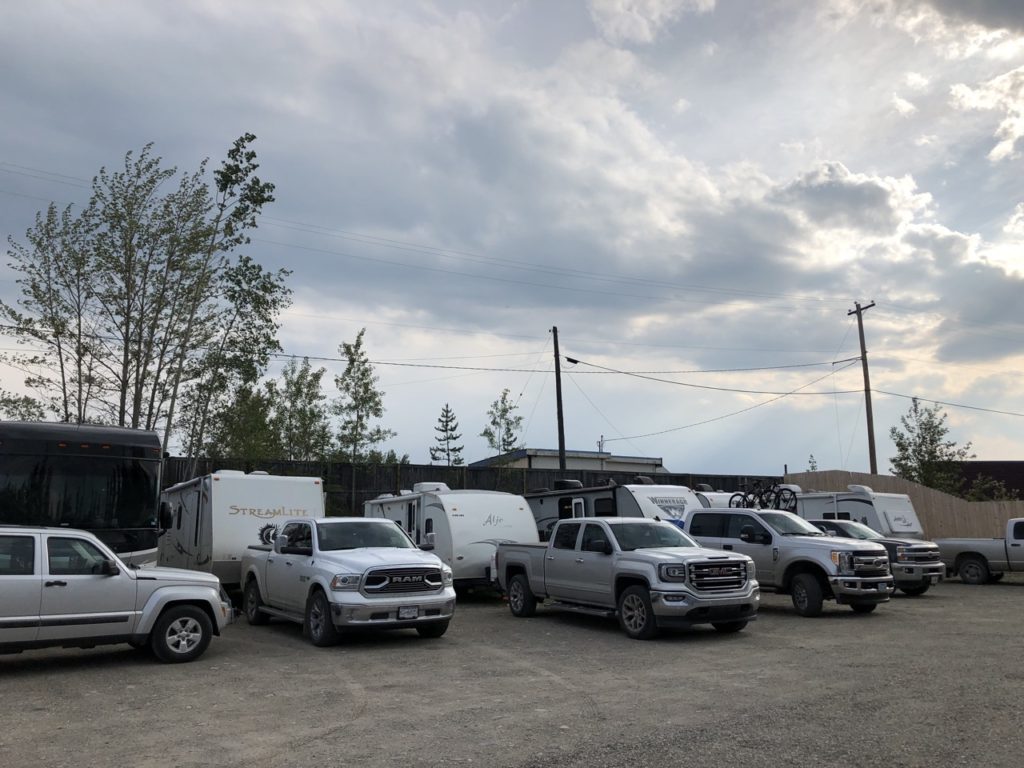
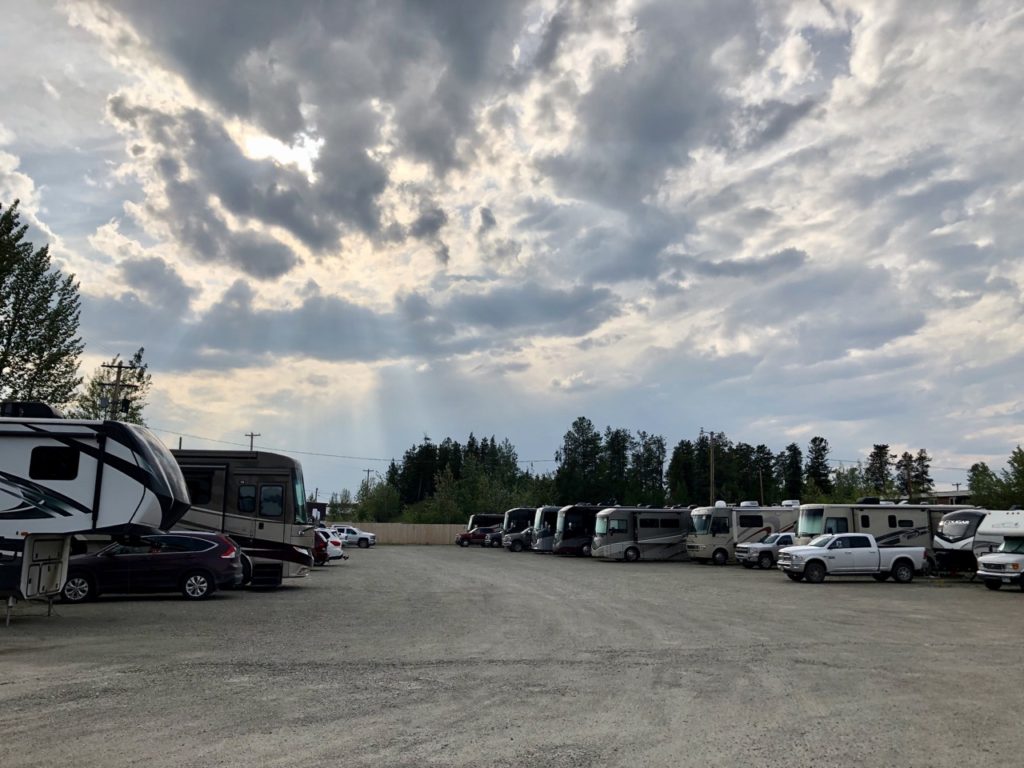
Others were fancier versions of parking lots with a table and a few trees delineating your site from your neighbors or had a stellar view that made you overlook the starkness of the lot. And of course many were in the woods, like this beautiful one at Liard Hot Springs.

Campgrounds came in a variety of sizes, ranging from 20 sites to several hundred sites. Your space might be so narrow you’re looking in your neighbors window or so spacious you feel like you have no neighbors. It could also be barely long enough to accommodate your RV (or trailer and truck in our case) and the corners to maneuver your vehicle into the spot so tight you jack knife the truck and sever the power cable to the trailer or have to ask the camper across the road from you to move their car so you have enough room to pull your trailer out.
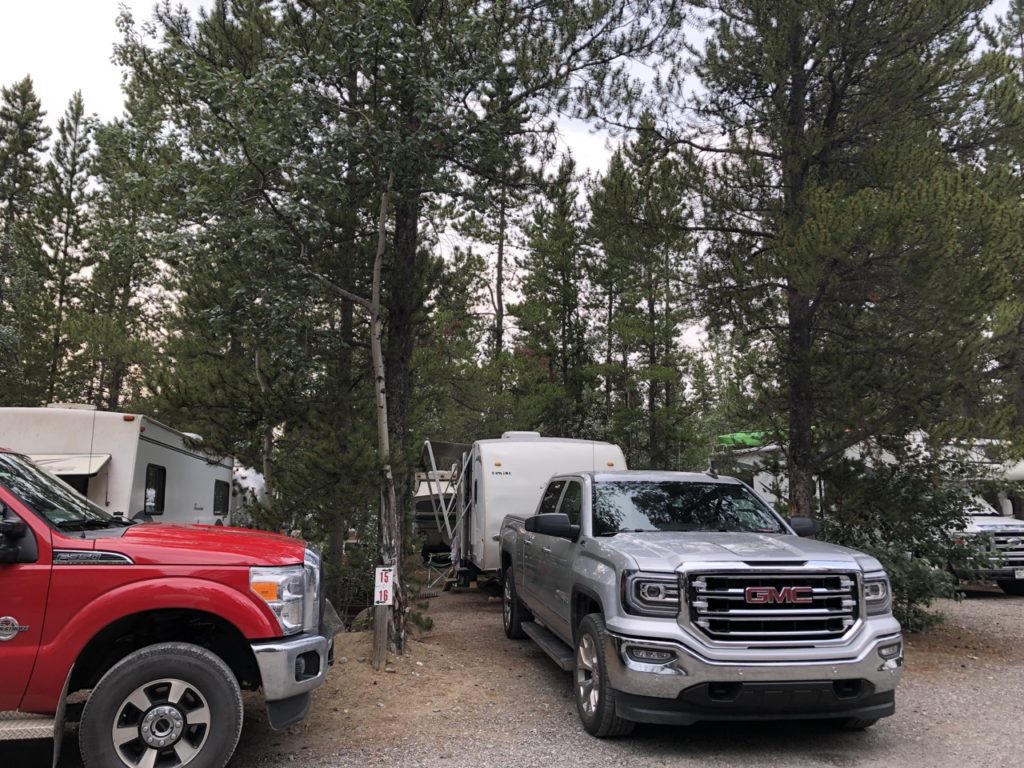
We made no campground reservations except for the leg between California and Jasper (northbound), in Denali (reservations a must!), and the leg between Washington and home (southbound). It’s a risk, especially in the more desirable destinations of Alaska, the ones the locals also like to visit, or if you’re driving a large Class A motorhome, or if you always need full hook-ups, or if you have the bad luck of traveling a stretch of road with limited camping options and a caravan has beat you to the punch. Sometimes we called a campground the morning of and made a reservation, though that option only worked if there was cell coverage. Many times we just took our chances and pulled in. We had only one campground turn us away and two very close calls.
If you like to sightsee while you drive your trip can be all about driving. But there are ample opportunities to get out of the car and hike, canoe, kayak, raft (whitewater or float), fish, and hunt. On our way back from the Granduc mine (outside Hyder, AK) we drove by a guy who was standing on the side of the road getting ready to repel himself down the side of the mountain to Salmon Glacier. All the First Nation communities have heritage centers, many of which are open to the public. The larger towns like Dawson City and Whitehorse have museums and even a few galleries. There are historic sites to visit like the dredge we toured outside Dawson City and steamboats that worked the rivers prior to the railroad. You can pan for gold. Coastal towns have water tours and fishing trips. You can simply enjoy nature. And of course, photography.
People ask if we had trouble finding laundromats, grocery stores, and gasoline. It was a concern of ours as we set out, and as it turned out, an unnecessary one. You fill your tank whenever there is the opportunity. Gas stations in these areas are spacious compared to the ones at home because there is space and most travelers have RVs. Most campgrounds had laundromats. Some were better than others, granted. Even though I needed to do it, I skipped laundry at “C” Lazy Moose RV Park. The warning sign about whites becoming discolored, iron in the water I think, scaring me off. But truthfully I kind of miss the laundromats. I could get the laundry done in an hour and half using multiple machines. Here at home, limited to one washer and one dryer, it takes me all day. Unless you have strict dietary requirements a grocery store is almost always available. Only in a few instances did we need something and find the local store wanting. In a few places we lucked out and even found a farmer’s market. There are dining options on the road too, though to be honest, I was glad in many places to be cooking my own food. The one gas station diner we stopped at to eat was terrible.
None of this would’ve been possible if not for Mark. While I’m a traveler, I did not grow up camping. While Mark and I had many fun tent camping vacations early in our marriage those were options we pursued for economic reasons. Sure, we talked then about how much fun it’d be to be a camp host at a campground or to visit all the National Parks. But those dreams disappeared as airline travel and hotel stays increased. I’m not mechanically inclined. Mark on the other hand, grew up camping, and pulling things like boats. He and his family built a cabin on a lake in Oregon when he was a kid. He has skills. His dream of the Alaska Highway gave me an experience I would not have otherwise had, and his skills got me back safe and sound. For all of this I am grateful.
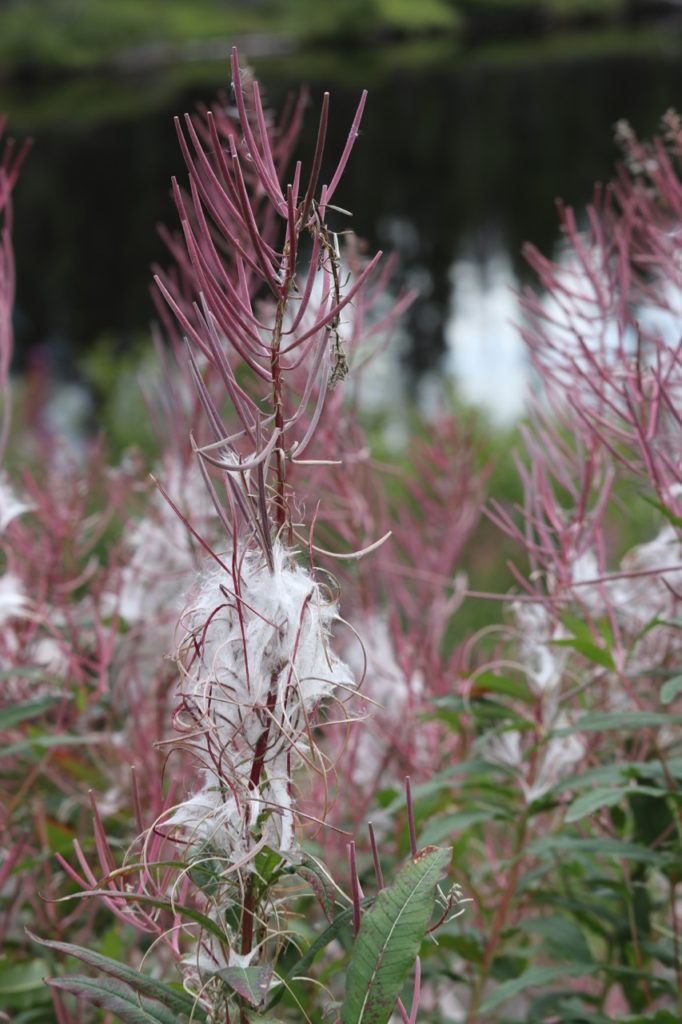

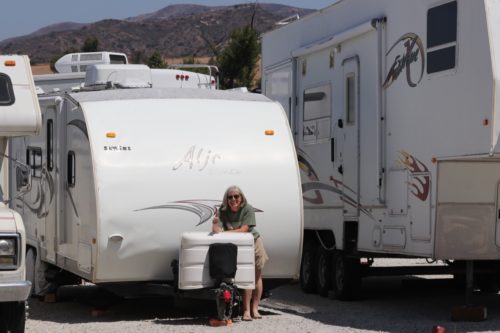

5 comments
You were in my thoughts this morning as I was preparing my first cup of coffee and was so pleased to discover the epilogue on my iPad. I’ve enjoyed your postings and the sharing of thoughts and feelings. I hope you don’t stop writing.
I can picture you at your kitchen table, morning light streaming in, or maybe sitting outside in your garden on a crisp morning, your cup of coffee and iPad in hand. Your words inspire me and give me pause. I’ll give the writing thing some thought.
You have a vivd imagination, that is one of the reasons you must write. Actually, I’m up at five. The birds have yet to greet me. I open my family room door as well as my kitchen door to a dark garden waiting for daybreak..As I am sitting in my rocker recliner taking my first sip of coffee the serenade begins. The iPad is opened and I begin to read my email.❤️ My day has begun.
I cannot love this epilogue any more than I do…beautifully told and beautifully lived. Nothing better than fulfilling a dream and then some…crossing off a bucket list item that inspires more to be added…
This has been absolutely fabulous to follow…and I look forward to going back through the archives to find some I missed because of life just continuing on and not waiting for me to catch up.
Thank you, my friend. Your beautiful words have touched me. Whenever you’re ready you’ll find all 20, I can’t believe I wrote 20 of them…under The Alaska Highway heading on the blog home page.